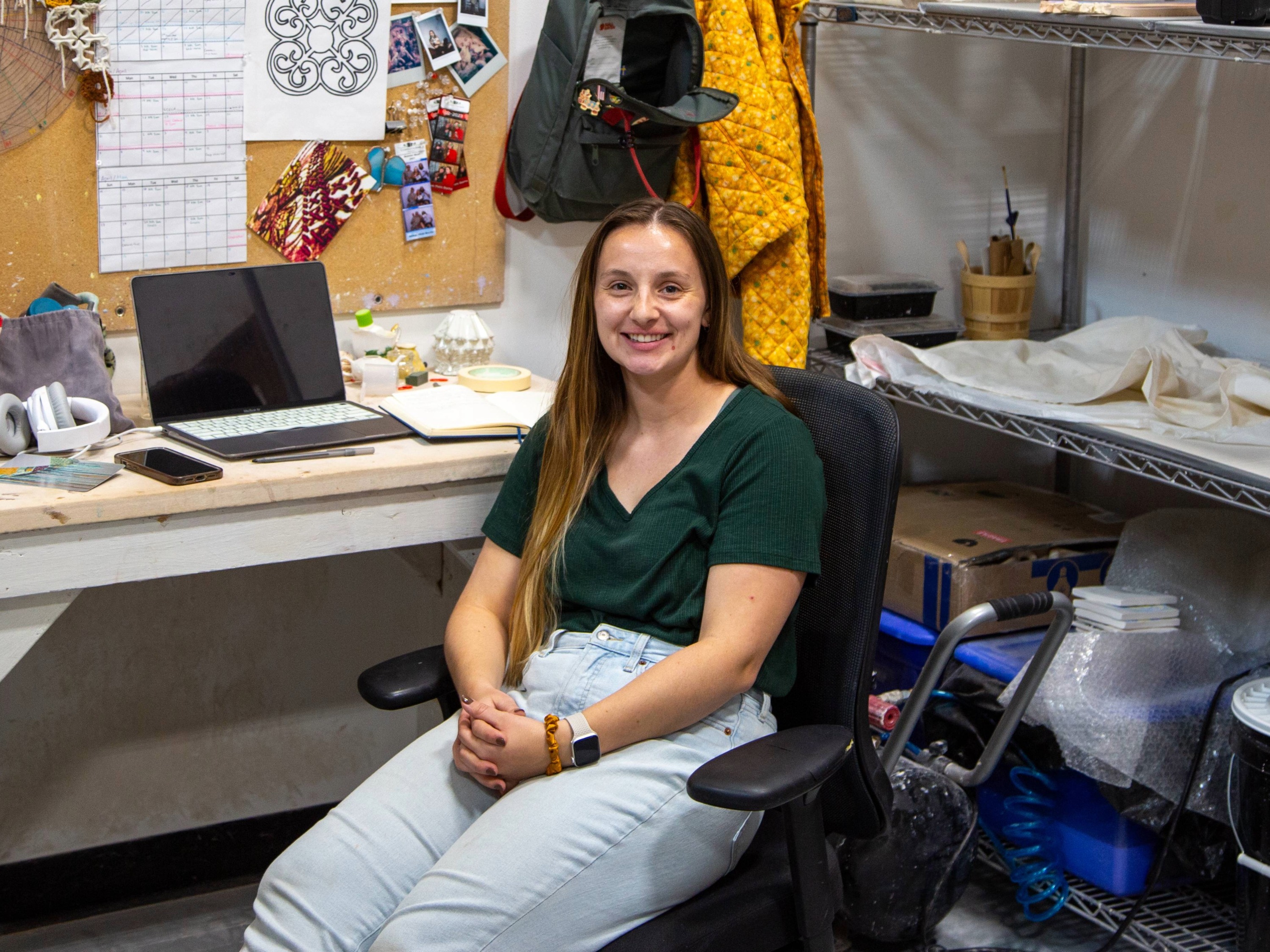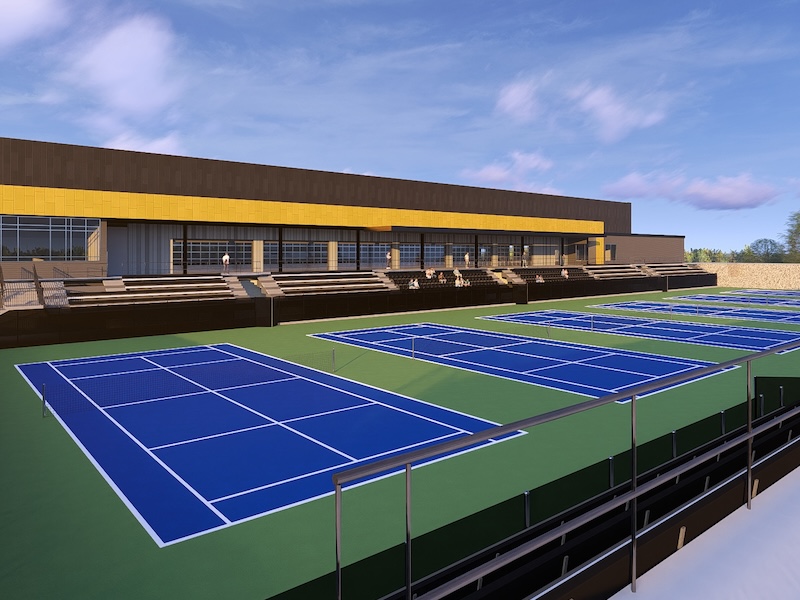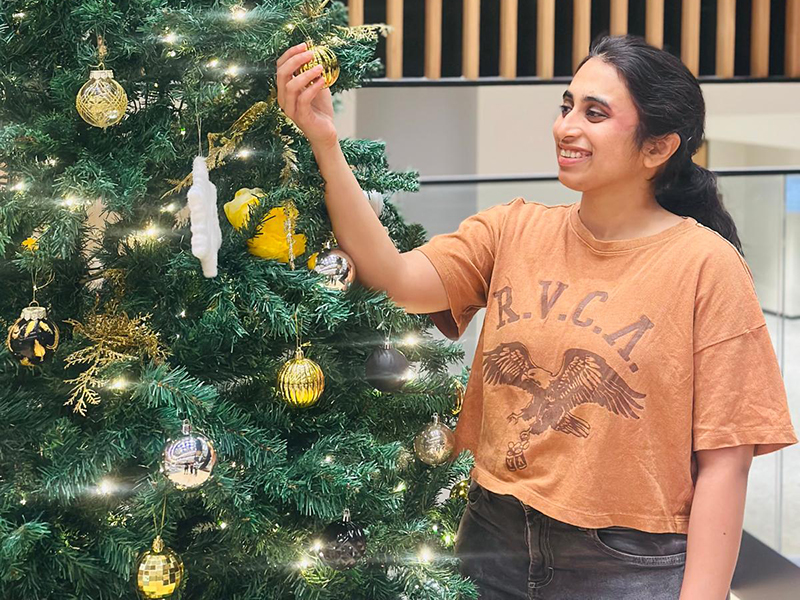Mollykate Geddis’ site-responsive work stimulates and celebrates anxiety, using crocheted ceramic tiles to play with the viewer’s schema. Originally from New Hampshire, Mollykate is graduating with her MFA in Studio Art with a concentration in Ceramics from Wichita State University’s School of Art, Design and Creative Industries.
What materials and processes do you use to create your work?
For my ceramic tile work, I use a porcelain body. Those who are more familiar with ceramics would refer to what I work with as a “dirty porcelain” – meaning it’s not made of the richest material, and it tarnishes into a taupe, not creamy white you would expect with traditional porcelain. The porcelain body is placed in a pressure release mold that allows me to produce tiles quickly. Using acrylic or velvet yarn granny squares, I will crochet the tiles together. The grog gives the dirty porcelain more structure and keeps the tiles flat, which really helps during the crocheting process.
What inspires your work?
My current work touches on my relationship with anxiety and the various coping mechanisms and regulation strategies I utilize. I’ve found porcelain, really the nature of the ceramic process itself, to be a great metaphor for anxiety as they share many similarities such as unpredictability and inconsistencies of breaking points. My repetitious, rhythmic, and predictable mode of working in contrast with the materials mirrors the therapeutic strategies often used when managing anxiety.
Not everyone has the same anxieties, or any at all. For me, when I enter an unfamiliar space, I immediately start piecing together things that make sense. When I encounter something that doesn’t make sense, I try to fit it into organizational strategies, patterns, or categories. With this body of work, I’m attempting to portray that system in a physical landscape. I’m not trying to show people the calm, I’m trying to show them the thought process of getting to the calm.
The process of your work is therapeutic for you—was this always the case?
I think subconsciously I always knew that hands-on, repetitive mark-making was soothing my anxiety, which is why I’ve always identified as an artmaker. In previous programs, I worked entirely with functional forms like radial patterns. The patterns involved a lot of math—something that is always correct—which gave a sense of predictable gratification. I’ve since steered away from the functional aspect, but some of those ideas are still present.
How do you predict the unpredictability of your materials?
I created a system! I learned very early on that there was no feasible way for me to get the results I wanted every time, and my loss rate was massive. I was producing work that made logical sense, but there was nothing the viewer had to figure out—there was no system the viewer had to go through to make sense of the environment being presented to them. Instead of creating work that followed a system, I created a system for what I already created. I do my firings, crochet my squares, and make my tiles – whatever I get, I must use. Pieces that come out flawlessly, less-than perfect, broken and so forth are all categorized and utilized according to the rules of the system. This forces me to use pieces I’m not familiar with, so in the work there are pieces that struggle to fit into the established pattern or scheme. Those little moments allude to the grander narrative I’m presenting.
Mollykate will be exhibiting her terminal project, “Visual Pleasure,” in the Clayton Staples Gallery from Friday, March 29th to Wednesday, April 3rd—with a closing reception on Wednesday, April 3rd from 5-7 p.m. in the McKnight Art Center.
You can find more of Mollykate's work on her Instagram at @mkg.ceramics.
Published stories will have a wheat kernel at the bottom of the page, so make sure to retain the existing full return after the College of Fine Arts Home rich link.
If you want to link to more information at the end of your post, you can insert a Rich Link w/ Icon snippet, as seen below. Leave the College of Fine Arts News Story Footer Links asset in place, so users have a way to get back to the homepage.
Find more of Mollykate's work via InstagramAll stories College of Fine Arts home






